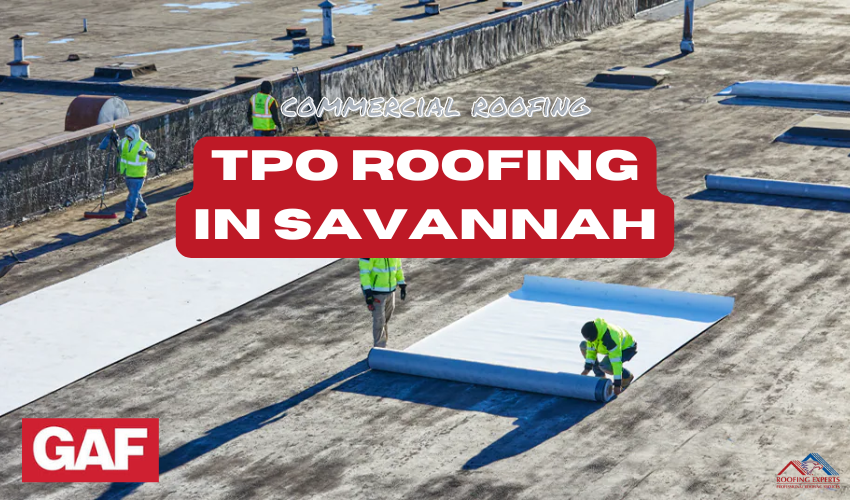Looking for a commercial TPO roofing system in Savannah?
Some folks treat a flat roof like it’s a trendy haircut—easy to get, easy to regret. Just ask anyone who picked cheap TPO roofs because their cousin’s friend saw it on HGTV. Savannah’s heat, surprise hail, and relentless humidity will test any roof faster than a summer blockbuster flops.
While TPO can outshine asphalt shingle, metal roof, or old concrete systems in energy efficiency, it also demands skilled roof installation, steady maintenance, and a crew who knows how to work around big air conditioning units. Ignore those details, and your next call will be for an emergency repair instead of a victory lap.
Before you trust just any roofing company to cover your commercial property or business, learn why TPO is booming—and why it sometimes fails. Keep reading to see if this roof is a smart investment or a shortcut you’ll regret.
How TPO Roofing Works—and What Makes It So Popular in Savannah
Think of TPO membranes as the modern answer to old concrete and EPDM rubber roofs that cracked and puddled after every Savannah storm. TPO stands for thermoplastic polyolefin, a single-ply material that gets heat-welded into wide, seamless sheets. Those welded seams aren’t just cosmetic—they help stop leaks better than glued systems ever could.
During a flat roof replacement, crews roll the membrane over insulation boards, secure it around edges and penetrations, and heat-fuse every joint to create a smooth barrier. Done right, this method keeps water from sneaking into hidden pockets and wrecking your insulation or decking. That detail alone is why many property owners are opting for TPO when planning a roof replacement or new construction project.
TPO’s bright surface also bounces back a huge chunk of Savannah’s brutal sunlight, lowering heat transfer and cutting cooling bills—a perk your insurance agent and power company both appreciate. And because reputable roofers back installations with strong warranties, many commercial and residential clients see it as a long-term shield against the unexpected.
Still, no material is magic. TPO can fail early if the installer cuts corners or uses cheap welds. That’s why you’ll hear experienced owners say the same thing: the product matters, but the hands putting it down matter more.
The Top Pros of TPO Roofing Savannah Homeowners Should Know
You don’t have to look far to see why TPO roofing systems have become the darling of Savannah’s flat roof scene. From new construction to big commercial upgrades, these membranes show up everywhere—because they solve problems older materials couldn’t handle. If you’re still on the fence, here’s what makes TPO a smart bet for so many owners tired of patching bitumen or replacing cracked asphalt shingle.
- Energy Savings: TPO’s white surface reflects heat better than a metal roof, helping your rooftop units run cooler and lowering your power bills all summer.
- Durability Against Weather: Properly welded seams can shrug off heavy rain, high winds, and the occasional Savannah hail storm without splitting open.
- Easy Maintenance: Compared to older built-up systems, TPO is easier to inspect and repair, which cuts down on surprise costs and hidden moisture.
- Strong Warranty Options: Reputable installers stand behind TPO installs with warranties that often beat what you’d get for asphalt shingle or EPDM.
- Adaptability: These membranes fit around vents, drains, and HVAC equipment without complicated flashing, making them a flexible choice for many roof layouts.
The best part? When installed by an experienced roofing crew, TPO can last decades without major problems. Just don’t confuse a lower maintenance schedule with no maintenance at all—every customer should plan for routine checks to keep their investment in top shape.
The Hidden Cons No One Tells You About Until It’s Too Late
TPO might sound like the perfect solution—and in many cases, it is. But every roofing system has a downside, and TPO roofs are no exception. The problem? Most of the red flags don’t show up until months—or even years—after installation. And by then, your warranty might already be useless, your insurance might deny coverage, and your budget could be buried under unexpected repairs.
Here’s what doesn’t make the sales pitch:
- Installer Skill Matters More Than You Think: TPO seams are heat-welded, not glued. If your contractor isn’t a trained expert, your roof becomes a giant patchwork of weak spots.
- Shortcuts Kill Longevity: Cheap or rushed TPO roof installation often skips proper insulation, edge detailing, or moisture barriers—cutting years off the roof’s life.
- No UV Resistance Without Additives: Unlike EPDM rubber or certain asphalt shingle products, TPO can degrade under UV if the membrane isn’t treated properly.
- Limited Real-World Track Record: While newer formulas have improved, some earlier TPO products aged poorly. The lack of long-term field data can still worry owners investing in long-term residential roofing services.
- Warranty Voids Are Common: If your roofing services provider isn’t licensed and insured, or you skip maintenance, your warranty likely won’t hold. Always read the fine print.
Always go with a licensed and insured local pro who knows Savannah’s climate, and ask hard questions about the material, the install, and the real longevity you can expect.
What It Really Costs to Install TPO Roofing in Savannah GA
Everyone wants the number first—“How much will it cost?” But here’s the part most contractors avoid saying out loud: the lowest quote for a TPO flat roof might be the one that costs you the most later. In Savannah, where heat, storms, and salt air team up to punish roofing systems, cutting corners to save a few bucks on installation can backfire fast. TPO might be one of the more affordable commercial roofing materials on paper—but the real cost depends on the details.
Here’s what goes into the final price tag:
- Material Costs per Square Foot: Most TPO membranes range from $5 to $9 per sq. ft., installed. Thicker membranes and insulation layers drive the price up—but also improve performance.
- Roof Complexity: A basic warehouse roof costs less than one with lots of penetrations, skylights, or HVAC systems. The more cuts and welds, the higher the labor.
- Tear-Off and Prep: If your existing roof must be removed or there’s water damage below, expect to pay more for labor and disposal. This is especially common during commercial roof repair jobs.
- Insulation Type and Thickness: Code-compliant insulation affects energy performance—and budget. It’s a must-have in hot, humid zones like coastal Georgia.
- Warranties and Extras: Want extended lifetime warranties or manufacturer-backed systems? They come at a premium, but they can boost your resale value and simplify future claims.
- Insurance Factors: Some home insurance and commercial insurance carriers offer rate discounts for reflective TPO roofs—but only if installed by certified pros with documented inspection reports.
TPO vs. Other Flat Roofing Systems: Which One Holds Up Best in Coastal Georgia?
You could ask ten roofers what flat roofing system is “best” and get ten different answers—especially if two of them still swear by old-school bitumen. But in coastal Georgia, where humidity hits like a wall and summer storms aren’t optional, not all materials play nice with the climate.
TPO stands out for its reflectivity, clean seams, and cost-effectiveness, especially in commercial builds. But it’s not the only option on the table. EPDM is a time-tested workhorse—cheap and flexible—but it absorbs heat, which isn’t ideal under Savannah’s relentless sun. PVC offers chemical resistance and fire protection, but it’s pricier and less forgiving during install. And then there’s bitumen, still clinging to life in some older buildings—thick, heavy, and cheap to repair, but high-maintenance and prone to bubbling under heat.
Some commercial clients even ask about metal roof options for low-slope areas, hoping to get extra longevity, but metal has its own drawbacks on flat surfaces, including expansion, tricky sealing, and noisy rain days.
Here’s the real difference: A great roofer doesn’t just pick a material—they match it to the building, use, and local conditions. TPO is popular because it balances cost, performance, and energy savings—but in the wrong hands, it won’t outperform anything. Choose a roofer who isn’t married to one material, but one who knows what works—and lasts—in our corner of Georgia. That’s the real win when investing in long-term commercial roofing services.
Verdict
TPO can be a smart move—or a shortcut to future leaks. It all depends on who installs it, how it’s planned, and whether anyone bothers to think past the next rainstorm.
Don’t roll the dice on something that protects your entire building. Call Savannah Roofing Experts and get a plan that actually fits your property—and our Georgia weather. We specialize in TPO and Commercial roofing repairs and installs.



Comments are closed